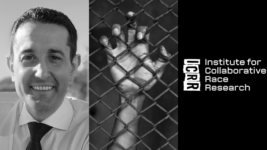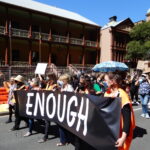Queensland Rushes to Pass Laws By Christmas That Would See Kids Sentenced as Adults

Draconian youth crime laws are set to pass Queensland parliament on Thursday, 12 December, which were long spruiked by the Crisafulli government in opposition, under the banner of ‘adult crime, adult time’, which will soon see youths that commit certain serious criminal offences, facing “adult-level” sentences in an effort to combat a manufactured “youth crime wave”.
Introduced by newly incumbent Queensland premier David Crisafulli on 28 November, the Making Queensland Safer Bill 2024 not only results in children serving adult prison sentences for a swag of crimes, but it removes the principle of detention being of last resort and that it is preferable for a child to be sentenced to serve time in the community rather than gaol.
“Under our framework, young people convicted of 13 prescribed offences… will face the same minimum, maximum and mandatory penalties that currently apply to adults in the Criminal Code,” Crisafulli said on introducing the bill. And he added that youths “found guilty of murder will be subject to mandatory life imprisonment with a mandatory minimum non-parole period of 20 years.”
The age of criminal responsibility in Queensland is 10, so these laws will apply to kids as young as this for the coming festive season.
And a further aspect of this youth crime crackdown is that the disproportionate rate at which the state’s criminal justice system targets and in turn, incarcerates First Nations youth means that the new laws chiefly target Indigenous children.
As the Crisafulli government rushes to pass these laws prior to the summer break, it should be noted that the Queensland Labor Party laid the groundwork for the Liberal Nationals to crack down on youth in this way, as it twice suspended the Human Rights Act 2019 (QLD) in 2023, in order to pass severe youth crime laws that obviously weren’t in accordance with human rights law.
Filling up kiddie prisons
Over the past year, there has been a rush to crackdown on youth crime in various jurisdictions across the country, as well as pushback from state premiers towards the national campaign to raise the age of criminal responsibility, and again, a characteristic of these crackdowns that don’t tend to make the headlines are that these repressive regimes disproportionately target First Nations children.
However, the recently incumbent Finocchiaro Country Liberal ministry in the Northern Territory and the freshly elected Crisafulli Liberal Nationals government in Queensland appear to be caught in a race to the bottom in terms of outdoing each other on just how draconian they can be when it comes to locking up Indigenous kids.
Although Crisafulli’s killing of his state’s treaty process that was already underway, on the same day that he introduced this package of youth crime laws, has perhaps taken the cake.
According to the Making Queensland Safer Bill’s explanatory notes, “the bill aims to hold young offenders who commit offences (particularly serious offences) to account by ensuring that courts are having primary regard to the impact of youth offending on victims and can impose appropriate penalties that meet community expectations”.
In order to achieve this, new section 175A will be inserted into the Youth Justice Act 2002 (Qld), which removes current “restrictions on minimum, mandatory and maximum sentences for children”, so that kids as young as 10 who commit certain offences contrary to the Criminal Code Act 1899 (Qld) will be facing the same penalties as adults who break these laws.
The thirteen serious criminal offences involved are murder, manslaughter, unlawful striking causing death, acts intended to cause grievous bodily harm and other malicious acts, grievous bodily harm, wounding, dangerous operation of a vehicle, serious assault, unlawful use or possession of motor vehicles, aircraft or vessels, robbery, burglary, entering or being in premises and committing indictable offences and unlawful entry of vehicle for committing indictable offence.
Section 50 of the Youth Justice Act contains sentencing principles. The new bill will insert further measures into this section, so that when a court sentences a child, it must not have regard to “any principle that a detention order should only be imposed as a last resort” or to “any principle that a sentence that allows the child to stay in the community is preferable”.
In order to commence sentencing children as adults, as well as to upend well-established sentencing principles, the legislation twice suspends the Human Rights Act, as these laws are “incompatible with human rights”.
And Crisafulli’s bill also results in a “new definition of a criminal history of a child”, so that it includes “cautions, restorative justice agreements and contraventions of a supervised release order”, and this entire record is then set to be considered on sentencing, and the impact of a child’s offending upon any victim/s will also be a priority sentencing consideration.
Making Queensland decidedly more dangerous
In its submission to the Queensland Justice, Integrity and Community Safety Committee (JICSC) inquiry into the bill, the Institute for Collaborative Race Research (ICRR) outlines that the rushed way in which these laws have been progressed in parliament mean the government has overlooked “best practice lawmaking”, in order to facilitate “political point-scoring at the expense of young lives”.
The committee process was representative of this, as the bill was sent to the committee on 28 November, and it permitted those who sought to provide submissions to the inquiry until 3 December to do so, and its final report was tabled on 6 December. Yet, despite the brief window left open to receive submissions, the committee did receive 176 such documents.
The JICSC inquiry report found that while the new legislation breaches the Human Rights Act, such breaches are “reasonable and justified” due to “exceptional circumstances” warranting the overriding of it.
However, the ICRR submission counters this, stating that the “Making Queensland Safer Bill introduces a host of legislative changes that will intensify state violence against the most marginalised children in Queensland”, and it makes certain that these laws “should not be passed”.
“Disregarding the state’s own evidence and human rights laws, this legislation promises to intensify racist and ableist violence against a new generation of children,” the institute continues. And it’s report further underscores that the laws are being released “on the back of a manufactured ‘youth crime crisis’” that has relied on the racist assertions by state politicians and media beat-ups.
And these laws are being progressed despite figures released by the Queensland Police Service, the Queensland Statistician’s Office and the Australian Institute of Criminology all revealing decreasing rates of youth in Queensland, including lowest recorded rates in 2022, while the Australian Bureau of Statistics has shown that youth crime has halved in that jurisdiction over the last 14 years.
ICRR further questions why laws are being progressed despite the bill’s statement of compatibility to human rights law clearly stating that these reforms are expected to have a “greater impact on Aboriginal and Torres Strait Islander children”, and this could specifically look like “more” First Nations kids “imprisoned for periods of time”.
In this compatibility statement that she prepared, Queensland attorney general Deb Frecklington rejects the assertion that these measures will “directly or indirectly discriminate based on race”, as the “increased sentences will be applied equally to all children who are convicted of an offence”.
However, the Queensland youth justice system has always disproportionately impacted First Nations kids.
Figures show that on an average night in the 2023 June quarter, Queensland had 306 youths aged between 10 and 17 incarcerated in its child prisons. And 59 percent of these kids were Indigenous, despite Aboriginal and Torres Strait Islander youth only accounting for about 6 percent of the broader population between those ages.
“Any legislation that requires the state to build more prisons for children, that puts more armed police on the streets and erodes human rights is not about making us ‘safer’. In fact, this type of legislation puts us all at a greater risk of harm,” the ICRR researchers make certain.
“Genuine community safety requires addressing the social conditions that lead to offending, while dismantling the structural violence perpetrated by this type of legislation,” the document adds.







